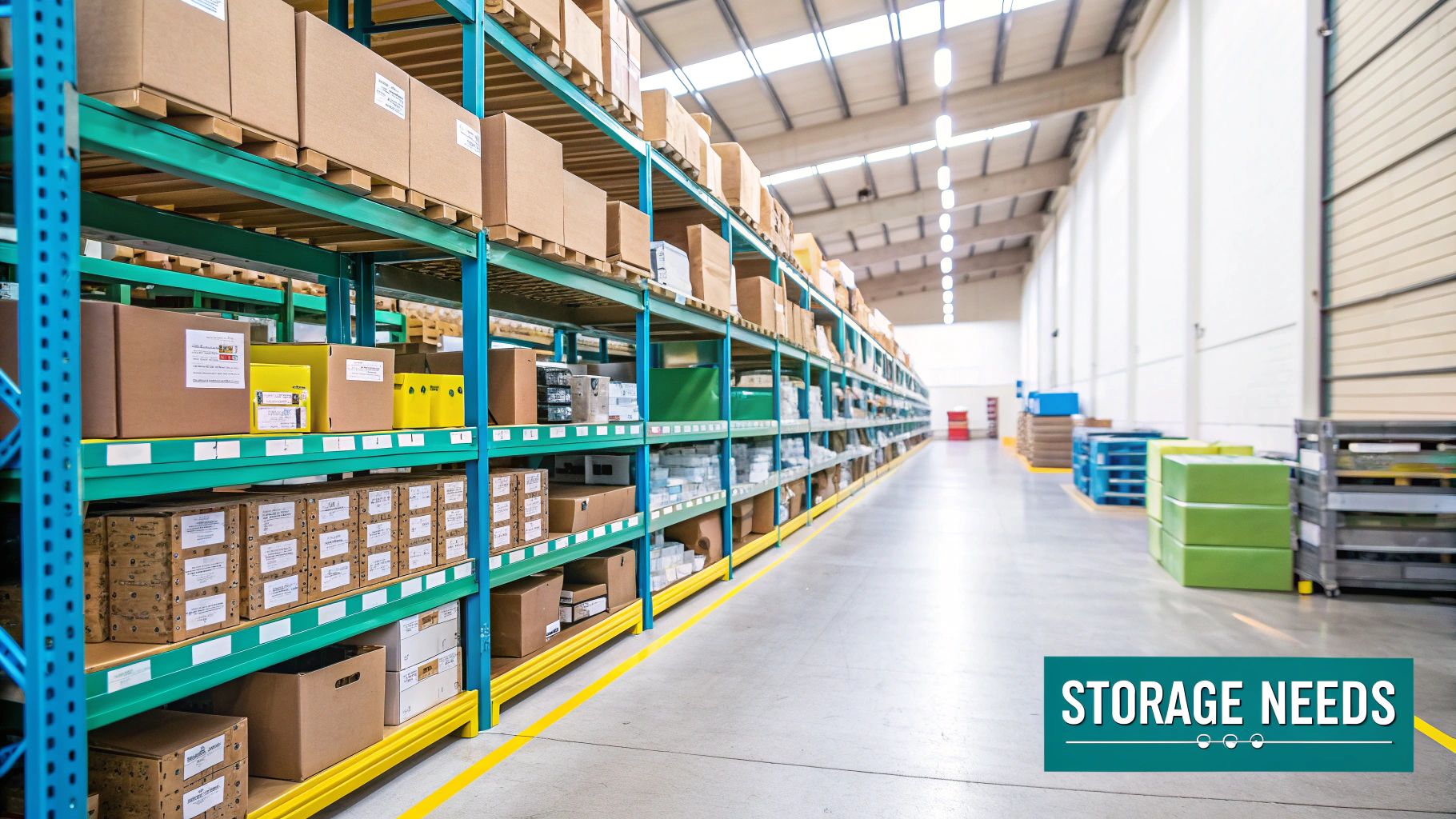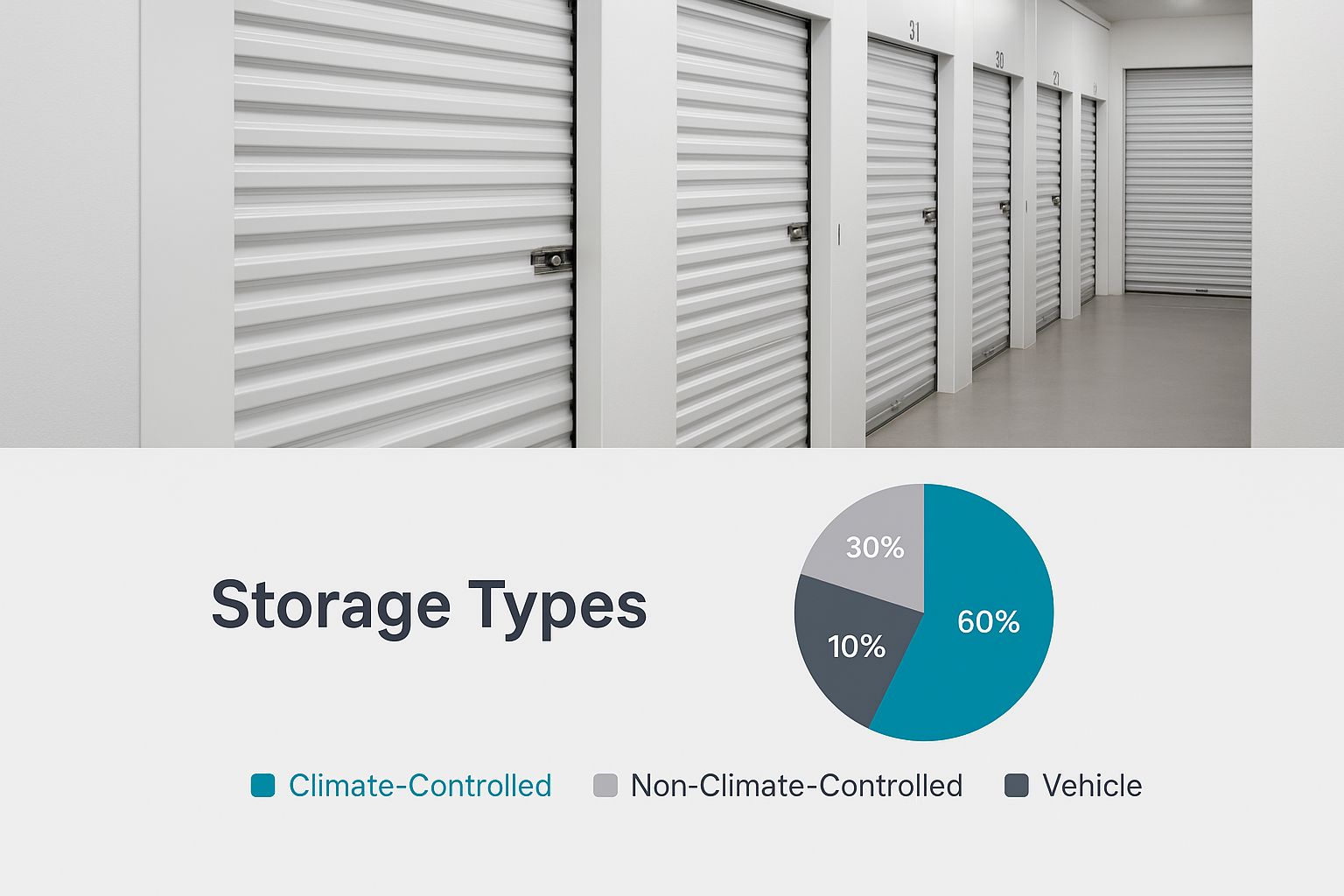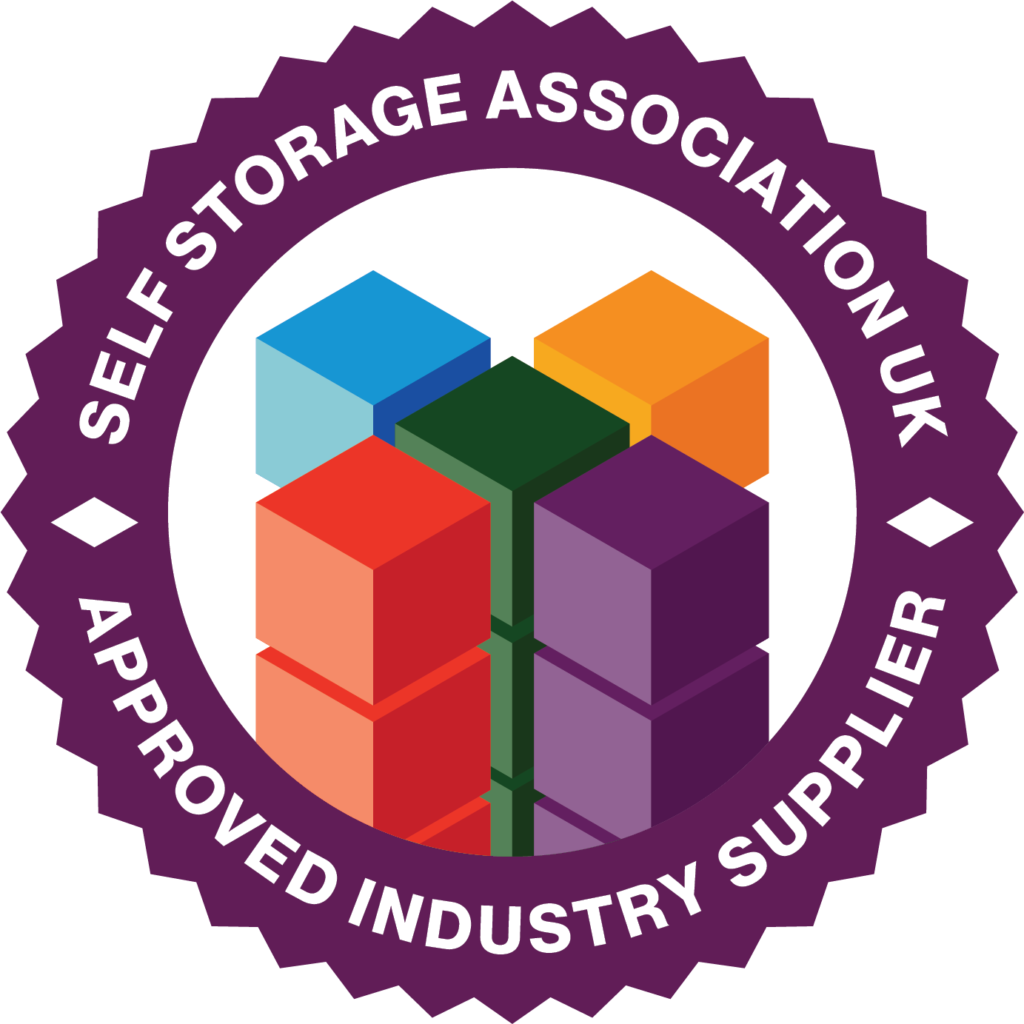For a growing number of UK businesses, storage units for business have evolved from a simple overflow cupboard into a genuine strategic asset. They offer a flexible, cost-effective way to manage everything from stock and equipment to archives, all without the headache and expense of a long-term commercial lease. This simple shift can turn a basic storage space into a dynamic hub for your operations.
Why Savvy Businesses Use Self Storage

Modern self storage facilities, like the one pictured, offer far more than just a locked space. This evolution from basic lock-ups to business-centric services is no accident. It’s driven by real-world pressures that smart companies are learning to use to their advantage. Let's dig into what’s really behind this trend.
Escaping High Commercial Rents
One of the biggest drivers is pure cost-effectiveness. With commercial rents soaring, especially in city centres, leasing a warehouse or a larger office can be a crippling expense for a growing business.
A secure self storage unit delivers the space you need for a fraction of the cost. This frees up vital capital that you can reinvest into what really matters—your stock, marketing, or people. For start-ups and established SMEs, that financial breathing room can be a complete game-changer.
Gaining Operational Agility
Today's market is all about adaptability. You need to be able to scale up or down at a moment's notice, whether it's to meet seasonal demand or react to shifting economic tides. This is where self storage really shines, thanks to flexible, rolling contracts.
Think of an e-commerce brand. They can rent a larger unit to handle the Christmas sales rush and then easily downsize in January without facing penalties. This pay-as-you-go approach removes the risk tied to long, rigid property leases. To get the most out of your rented space, you can find more guidance in our article covering 5 essential tips for maximising business storage space.
A self storage unit transforms from a simple cost into a powerful tool for inventory management, operational efficiency, and scalable growth, giving businesses a vital competitive edge.
The sector's growth speaks for itself. The UK self storage industry's turnover has hit around £1.2 billion, and an incredible 24% of users are now running a business directly from their unit. This shows just how essential these facilities have become for SMEs, tradespeople, and online retailers who need flexible and secure solutions to thrive.
Pinpointing Your Actual Business Storage Needs

Before you even start looking at prices or locations, the first and most crucial step is getting crystal clear on what you actually need to store. It’s tempting to rush this part, but I’ve seen it time and again: businesses end up with a unit that’s either too big, too small, or missing a feature they later realise was essential. This creates operational headaches nobody has time for.
A proper needs analysis isn't just about measuring your current overflow; it’s about figuring out the exact role storage will play in your business.
So, start by creating a detailed inventory of every single item you plan to store. Don't just eyeball it—make a proper list. Group things into logical categories like stock, equipment, archived documents, and marketing materials.
This process does more than just tell you how much space you need; it flags up special requirements. For example, a small online business making candles would quickly realise their wax stock needs a climate-controlled unit to stop it from melting in the summer. It’s a small detail that’s easy to miss but can make or break your inventory.
Looking Ahead: Projecting Future Storage Needs
Your storage needs today probably won't be the same in six months or a year. Good planning means looking ahead to avoid the hassle of moving units simply because you’ve outgrown your space. Think about your business's natural rhythm and cycles.
- Seasonal Peaks: An e-commerce business selling garden furniture knows they'll have a massive influx of stock leading up to spring. They should be looking for a facility that lets them easily scale up their unit size for those key months.
- Business Growth: A construction company that just landed a major contract will need space not just for tools, but for bulk materials and site supplies. Planning for this growth ensures they aren't left scrambling for space when a project is kicking off.
- Archiving Schedules: A law firm might have a strict policy of archiving old case files every quarter. This predictable increase in document boxes needs to be factored into their long-term storage strategy.
Your inventory isn’t just a list; it’s the blueprint for your storage needs. It dictates the unit size, the type of access you'll need, and the level of security that makes sense for your assets.
Finally, think about how you'll use the unit. Will you be there every day picking and packing orders? Or will you only visit once a month to drop off archive boxes? The frequency and nature of your visits will heavily influence the best location and access hours, turning a simple storage space into a genuinely efficient part of your business.
Choosing the Right Unit Type and Size
The difference between a standard indoor locker and a drive-up container can genuinely make or break your operational efficiency. When you're looking at storage units for business, it’s not just about getting enough space; it’s about finding a unit whose features align perfectly with your daily workflow and what you’re actually storing.
Think of it this way: a creative agency with sensitive electronics and years of client portfolios needs a climate-controlled unit. It's a non-negotiable for protecting delicate items from the damp and temperature swings that could cause costly damage. On the other hand, a landscaping company would get a massive productivity boost from drive-up access, letting them load heavy mowers and equipment straight from their van. That saves a huge amount of time and physical effort.
Matching Unit Features to Your Business Model
The real key is to think beyond square footage and consider how you’ll physically use the space day in and day out.
- Indoor Units: Tucked inside a larger building, these offer an extra layer of security and total protection from the elements. They are the go-to choice for high-value stock, critical documents, or electronics.
- Drive-Up Units: These are essentially a private garage. They offer unbeatable convenience for any business that moves heavy or bulky items on a regular basis. Builders, e-commerce sellers with large products, and market traders find them absolutely invaluable.
- Climate-Controlled Units: By keeping temperature and humidity levels stable, these units stop things like wood warping, mould growing, or electronics degrading. They are essential if you're storing anything from furniture and artwork to pharmaceuticals.
This variety means there's a storage solution out there that fits your business model like a glove.

The image above really shows the clean, secure, and varied options available at a modern facility. Getting to grips with these different types is the first step to making a smart decision that actually supports your business.
Demystifying Unit Sizes for Commercial Needs
Once you’ve settled on the type of unit, sizing is the next hurdle. It’s so easy to get this wrong – either underestimating and creating a logistical nightmare, or overestimating and wasting money. A good facility will help you translate your real-world inventory—be it pallets of stock, archive boxes, or product bins—into clear unit dimensions.
Demand from businesses has been a major driver behind the recent expansion of UK self storage. The total floorspace grew by 7.2% to an estimated 64.3 million square feet, as detailed in the 2025 UK self storage industry report. This boom means more choice, but it also makes picking the right size even more important.
Don’t pay for air. A precise understanding of your inventory volume ensures you only rent the space you genuinely need, optimising your costs from day one.
To help you visualise what you might need, we've put together a simple guide.
Business Storage Unit Size Guide
This table provides a quick reference to help you estimate the right unit size based on common business storage needs.
| Unit Size (sq ft) | Typical Dimensions (ft) | What It Can Hold (Business Examples) | Best For |
|---|---|---|---|
| 25-50 | 5×5 to 5×10 | Archive boxes (80-100), tools, small stock, marketing materials | Sole traders, document archiving, startups |
| 75-100 | 10×7.5 to 10×10 | Contents of a small office, 1-2 pallets of stock, contractor equipment | E-commerce sellers, small contractors |
| 125-150 | 10×12.5 to 10×15 | Small warehouse stock, bulky equipment, contents of a transit van | Online retailers, tradespeople, event planners |
| 200+ | 10×20+ | Palletised goods, large machinery, entire office relocation contents | Wholesalers, construction firms, large retailers |
Remember, this is just a starting point. The best way to be sure is to chat with a storage expert who can help you assess your items.
To get an even better idea of what would work for your specific items, take a look at our detailed guide to business and commercial storage solutions.
Evaluating Security and Access
When you’re trusting another company with your business assets, a simple promise of "it's safe" just won't cut it. You need to know for sure that your inventory, equipment, or confidential documents are properly protected. Think of it less like a casual tour and more like a security audit. Peace of mind is the ultimate goal, and that comes from knowing exactly what security and access features are in place.
So, where do you start? First, look for the non-negotiables. Any modern, reputable facility should have a multi-layered approach to security. We're talking about robust perimeter fencing, electronic gate access, and comprehensive 24/7 CCTV that covers more than just the front door—it needs to monitor the internal corridors too. If a facility doesn't have these basics, it's a red flag.
Beyond the Basics: Features That Really Matter for a Business
Once you’ve ticked off the standard security measures, it’s time to dig into the details that separate an average storage provider from a genuine business partner. These are the features that can make or break your daily operations.
Ask some pointed questions:
- Are the units individually alarmed? A general building alarm is one thing, but an alarm on your specific unit adds a powerful, direct layer of protection.
- Is there staff on-site? Having a physical presence during opening hours is a huge deterrent for opportunists and means someone is there to help if you have a problem.
- What are the access hours? This is a big one. If you need to grab stock on a Sunday evening for a Monday morning job, a facility that shuts at 5 pm on weekdays simply isn’t going to work for you.
A facility's accessibility is just as important as its security. If you can't get to your goods when you need them, the storage unit becomes a hindrance rather than a help to your business workflow.
You should also look for practical amenities that make your life easier. Are there loading bays, goods lifts, or trolleys available to help you move items without breaking your back? Is there Wi-Fi you can hop onto for a quick stock check or to answer an urgent email? Some facilities even offer package acceptance services, which can be a game-changer for e-commerce businesses.
These operational supports are what turn a simple storage space into a seamless extension of your business. For more tips on what to look for, our guide on how to choose the best storage facility has plenty of extra advice.
Understanding the True Cost of Business Storage
The advertised weekly or monthly rate for a business storage unit is often just the beginning of the story. To budget accurately and avoid any nasty surprises down the line, it’s vital to look beyond the headline price and understand the full financial picture. The most cost-effective choice isn't always the cheapest; it's the one that delivers genuine value for your business.
When you're comparing providers, you'll quickly realise the final price can be influenced by several factors that aren't always obvious at first glance. Think of it like booking a budget flight—the initial fare looks fantastic, but the extras can add up fast.
Looking Out for Additional Fees
A common mistake is failing to account for mandatory add-ons that can inflate your monthly bill. Before you sign any agreement, make sure you ask about these potential costs:
- Mandatory Insurance: Most facilities will insist you have insurance for your stored goods. While your existing business policy might offer some cover, many require you to purchase their specific in-house policy.
- Admin Charges: Some providers charge a one-off administration or setup fee when you first take out the unit. It's a small detail that's easy to miss.
- Lock Purchase: You'll almost always need a high-quality padlock to secure your unit. Check if you can bring your own or if you have to buy one directly from the facility.
The real cost of a storage unit is the base rent plus any compulsory fees. Always ask for a full, itemised quote to see the total amount you’ll be paying each month.
The self-storage market is only getting more competitive. Projected growth for new developments in the UK suggests a nearly 17% increase in operational sites. As new facilities open up, this rising competition often leads to better pricing and more options for business customers like you.
Finding Genuine Value in Business Storage
Securing a good deal involves more than just hunting for the lowest price. For instance, you'll see plenty of facilities offering attractive introductory deals, like the first month for just £1. These can be fantastic, but always check the standard rate you’ll move onto afterwards so you know the true long-term cost.
Don’t be afraid to discuss terms, either. If you know you'll need the unit for six months or longer, it’s always worth asking if they offer a discount for a long-term commitment. The key is to balance these costs against essential features like 24/7 access or advanced security. To find that perfect balance of space and cost, it's often helpful to use an online tool, and you can get a quick estimate with this handy storage calculator.
Making Your Business Storage Work for You
Securing a storage unit for business is a great first step, but the real value comes from turning that space into an efficient, active part of your company. A well-organised unit is more than just a cupboard; it’s a strategic hub that can directly support your daily operations and growth. The goal is to move beyond passive storage and create an organised, accessible extension of your workspace.
Simply stacking boxes to the ceiling might seem like you’re making the most of the space, but it quickly becomes a nightmare when you need to find a specific item in a hurry. The key is strategic organisation that prioritises access, not just cramming things in.
Creating an Efficient Workspace
Smart organisation begins before you even move the first box. A bit of planning can transform a bare unit into a high-functioning micro-warehouse, saving you countless hours down the line.
- Invest in Freestanding Shelving: Whatever you do, don't stack boxes directly on top of each other. Sturdy, freestanding shelving units let you use the full height of your unit while keeping every single box visible and easy to grab. This is an absolute game-changer for stock management.
- Establish Clear Zones: Designate specific areas within your unit for different things. You could have fast-moving stock near the front, archival documents tucked away at the back, and equipment in a dedicated corner. This simple zoning saves time and stops your team from getting confused.
- Label Everything Meticulously: Go beyond scribbling "stuff" on a box. Use clear, detailed descriptions and maybe even a colour-coded system for different item types. It’s a small step that makes finding what you need incredibly fast.
The ultimate aim is to create a system where anyone from your team can walk into the unit and find exactly what they need in under a minute. That level of organisation transforms your storage from a cost into a real productivity tool.
Integrating Your Unit into Daily Operations
Once your unit is organised, the next move is to weave it seamlessly into your supply chain and daily tasks. This is where you unlock its full potential. Start thinking of it as an off-site stockroom or workshop that actively supports your business.
You could even create a small, dedicated workstation inside the unit. A simple folding table and a chair can provide a space for packing online orders, sorting through inventory, or handling admin right where your items are stored. With many facilities now offering on-site Wi-Fi, this is a genuinely practical option.
You should also look at streamlining your logistics. If your facility accepts deliveries, you can have stock sent directly there, saving you the hassle of handling it at your main premises first. This is especially useful for e-commerce businesses managing a constant flow of goods. By treating your unit as an operational hub, you can seriously improve your business's efficiency and responsiveness.
Your Business Storage Questions Answered
So, you’ve got the basics down. But I know from experience that a few key questions always pop up when businesses are on the verge of choosing a storage unit. Let's get those sorted so you can move forward with total confidence.
Do I Need Special Business Insurance for My Stored Goods?
Yes, you absolutely do. Proper insurance isn't just a good idea—it’s a requirement at most storage facilities. Before you go out and buy a new policy, have a look at your current business insurance. You might be pleasantly surprised to find it already covers goods stored off-site.
If not, you'll need to arrange separate cover. Your storage provider will likely offer their own insurance plan for a monthly fee, which is a convenient option. The most important thing is to confirm the level of coverage required to make sure your stock or equipment is fully protected against risks like fire, theft, or damage.
Can I Have Deliveries Sent Directly to My Storage Unit?
This is a game-changer for many businesses, and the answer is often yes. Many modern facilities that cater to business clients are happy to accept deliveries on your behalf. This is especially handy for e-commerce businesses waiting on stock or tradespeople getting supplies sent from a wholesaler.
But—and this is a big but—you must confirm this service with the site manager first.
Don’t just assume they’ll sign for packages. Ask about their specific procedures, delivery hours, and whether they will hold items for you. Getting these details right is crucial if you want to integrate the unit seamlessly into your supply chain.
Are There Restrictions on What I Can Store?
Definitely. Every storage facility has a list of prohibited items, and it's there for good reason—safety, legal, and insurance purposes. The standard list nearly always includes flammable or hazardous materials, so things like fuel, chemicals, and paint are a no-go.
You also can’t store perishable goods (no one wants that surprise!), live animals, or anything illegal. It’s always best practice to ask the provider for their complete list of restricted goods. This ensures you’re fully compliant with their terms and avoids any headaches down the line.
Ready to find a secure, flexible, and affordable space for your business? Shield Self Storage offers premium storage solutions in The Wirral with 24/7 CCTV, easy access, and a special introductory offer of just £1 for the first month. Get your instant quote today!



